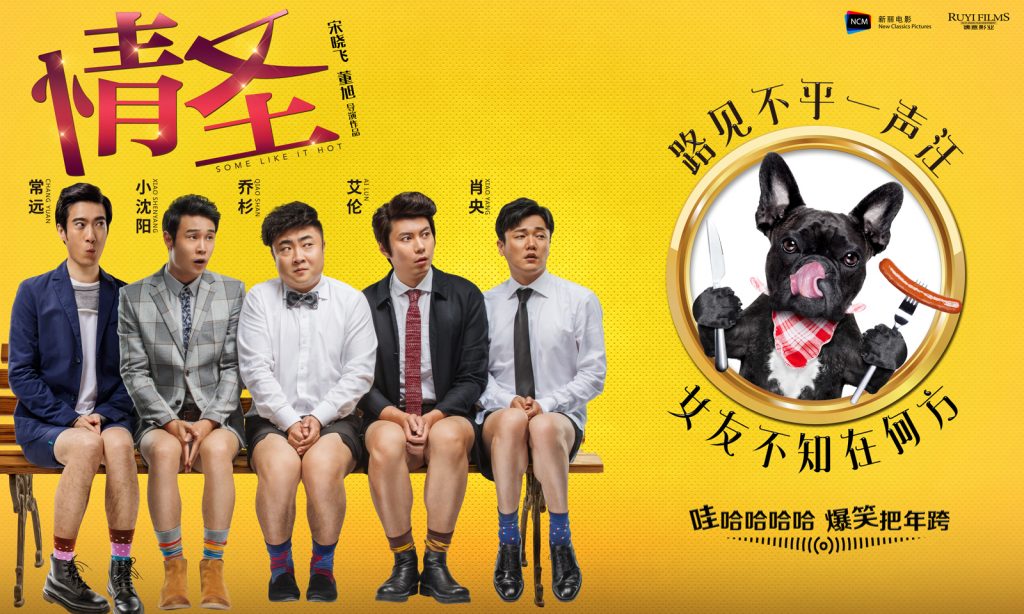Every day while CFI’s Hollywood readers take in the business of the Chinese film industry, the actual movies can sometimes seem exotic or remote. But in major US cities, mainstream Chinese films are increasingly available: thanks to Wanda’s purchase of AMC and distributors like China Lion, they get American theatrical releases practically simultaneous to their premieres at home. Though they receive virtually no publicity outside the non-Chinese community, these films are more than worth seeking out by anyone serious about engaging the Chinese industry, understanding the Chinese sensibility and familiarizing themselves with China’s talent pool. Periodically, CFI will review and point readers in the direction of noteworthy US releases of contemporary commercial and independent Chinese titles.

French Sex Farce With A Chinese Face
Some Like It Hot (2017), directed by Song Xiaofei & Dong Xu; Written byYu Miao and Xi Liao.
Distributed in the US by China Lion (Theaters here)
A romantic comedy possessing the wit and tang of Billy Wilder would mark something of a milestone in the evolution of Chinese cinema — cause for celebration, indeed, but any expectations you might bring to Some Like It Hot based upon its title are bound to be thwarted.
Instead what you get is a typical, and not unentertaining contemporary Chinese comedy of upwardly-mobile, city-dwelling, professional-class Chinese boy-men, dumbstruck by hot young women who are not their wives, with an unsubtle moral tacked on the end.
In southern, subtropical Guangzhou, a group of thirtysomething guys gather around whisky and a pole dancer to mourn the sudden loss-to-a-heart-attack-while-
One of the crew, Han, an advertising executive played with a guileless dopiness by Xiao Yang (star of last year’s blockbuster, Detective Chinatown), vows to do something about it. Trouble is, he’s married and the first woman who catches his eye isn’t his wife but Yoyo, a model played by the wide-eyed and curvy Korean actress Clara Lee, whose spoken lines are mostly limited to practicing Chinese in a language classroom setting.

As in the Wilder film from which it takes its name, hot pursuit ensues, with farcical escalation (though no cross-dressing) and the repeated near-discovery of the boys’ shenanigans by Han’s placidly forbearing wife (Dai Lele).
Without a meaningful ratings system, any Chinese attempt at a sex comedy is bound to be pretty tame by Western standards, and the hijinks portrayed are all in soft-focus or alluded-to rather than fully-exposed, so as not to rile SAPPRFT. (The film’s most blatant risqué image is of a hotel Do Not Disturb sign that flashes the image of two stick-figures in flagrante delicto, if only for an instant).
And Han, like many a romantic lead, is foiled by circumstance and fails to achieve the release he seeks. He flies secretly to Thailand, again evading his wife, to oversee Yoyo in a beach bunny photo shoot for an ad campaign he’s dreamt up, but the model must fly off to Paris before they are able to tryst. He braves inviting her to dinner, then the movies, only to discover, to his horror, he’s accidentally invited somebody else—an ad agency colleague, his boss, the love-starved Ms. Ma (Yan Ni)—who falls for him because he keeps leaving her flowers and romantic notes—or so she thinks. (The romantic notions actually are coming her way from a friend of Han’s who, true to their late, deceased buddy, has fallen for her, of course, at first sight).
Around and around we go, through two subplots following other boy-men in the pursuit of getting laid—though fart humor, a high speed foot chase through a hotel wrapped only in a bath towel, and an odd montage sequence at a wild animal park that belongs… well, in a promo video for a famous Chinese wild animal park whose name I won’t repeat, since reviews aren’t for product placement.
Co-directors Song Xiaofei and Dong Xu have molded the screenplay by Yu Miao, and Xi Liao into a mildly entertaining, if predictable popcorn misadventure that marries the popular “blundering guys” farces of Xu Zheng (Lost in Thailand and its sequels, on which Song & Dong both worked as cinematographer and sound designer) to more femme-centric aspirational/materialistic rom-coms like Go Lala Go! and Finding Mr. Right.
Western viewers may experience some cognitive dissonance resulting from the contrast of these characters’ professional achievement and material wealth against their emotional unsophistication and limited relationship experience (even among those who are married). What’s more, Chinese views toward workplace romance and what HR would consider harassment are apparently more in line with Mad Men-era Western standards than those of today.
Which brings us to the moral, stated clearly, in the third act by the most flagrant of the womanizing crew. Comedian Xiao Shenyang, who gets chased around the hotel in the towel after being nearly caught in the act, finally delivers the best comedic set piece of the film (wearing only an apron that barely conceals his backside). He tells Han that he is “retiring,” and will no longer pursue the fairer sex. “You can run around all you want, but in the end you have to go home.” One can almost see the moralists at the Film Bureau flipping through their box of index cards of chauvinistic Confucian fixes.
Released in China on December 30, Some Like It Hot has pulled down $64.5 million in a few weeks, handily outgrossing the galactic import Rogue One ($46.2 million). Chinese movie review sites said the film captured what modern life feels like for China’s male white-collar urbanites. One such site, pulling comments from web giant Tencent’s popular Weixin instant messaging platform, pegged collective viewers’ ratings at 6.3 out of 10 [http://mp.weixin.qq.com/s/
The head-fake of its borrowed title also obscures that the film actually is a remake: the opening credits acknowledge a little-remembered wacky French comedy from the ‘70s, Pardon Mon Affaire, subsequently reworked in Hollywood as The Woman in Red, with supermodel Kelly LeBrock in the titular, mid-life-crisis-inducing role.
This latest version proves yet again that cinematic cross-fertilization though imitation and adaption is alive and well across the Pacific. This is a fact one must accept, even if, in the end, one doesn’t entirely approve of lazy cannibalization and predictable results.
WHAT DOES THE GRADE MEAN?
Here are some recent & modern-era vintage Chinese and Hong Kong films for comparison
- A+
- PLATFORM (2000, dir Jia Zhangke)
- THE WORLD (2004, dir. Jia Zhangke)
- DRUNKEN MASTER 2 (1994, dir. Lau Kar Leung & Jackie Chan)
- KUNG FU HUSTLE (2004, dir. Stephen Chow)
- A
- LET THE BULLETS FLY (2010, dir Jiang Wen)
- THE MERMAID (2016, dir. Stephen Chow)
- A TOUCH OF SIN (2013, dir. Jia Zhangke)
- STILL LIFE (2006, dir. Jia Zhangke)
- MOUNTAINS MAY DEPART (2015, dir. Jia Zhangke)
- LITTLE BIG SOLDIER (2010, dir. Ding Sheng)
- EXTRAORDINARY MISSION (2017, dir. Alan Mak & Anthony Pun)
- MR SIX (2015, dir. Guan Hu)
- A WORLD WITHOUT THIEVES (2004, dir. Feng Xiaogang)
- SUZHOU RIVER (1999, dir. Lou Ye)
- HOUSE OF FLYING DAGGERS (2004, dir Zhang Yimou)
- RAISE THE RED LANTERN (1991, dir. Zhang Yimou)
- A-
- DUCKWEED (2017, dir. Han Han)
- I BELONGED TO YOU (2016, dir. Zhang Yibai)
- B+
- THE GREAT WALL (2016, dir. Zhang Yimou)
- OLD STONE (2016, dir. Johnny Ma)
- CRAZY STONE (2006, dir. Ning Hao)
- GO, LALA GO (2010, dir. Xu Jinglei)
- B
- KUNG FU YOGA (2017, dir. Stanley Tong)
- RAILROAD TIGERS (2016, dir. Ding Sheng)
- THE WASTED TIMES (2016, dir. Cheng Er)
- CHONGQING HOT POT (2016, dir. Yang Qing)
- MONSTER HUNT (2015, dir. Raman Hui)
- B-
- JOURNEY TO THE WEST: THE DEMONS STRIKE BACK (2017, dir. Tsui Hark)
- SOME LIKE IT HOT (2017, dir. Song Xiaofei & Dong Xu)
- BORN IN CHINA (2016, dir. Lu Chuan)
- D-
- TINY TIMES (2013, dir. Guo Jingming)





